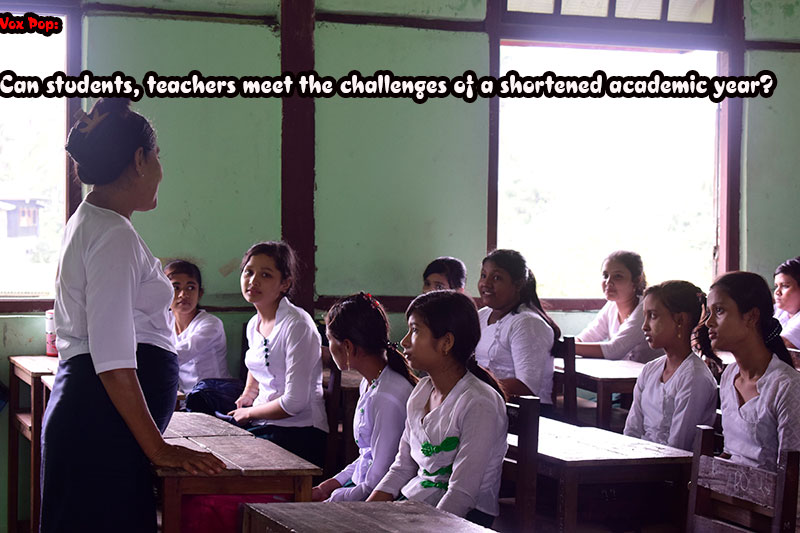- IDPs in Kyauktaw struggle with collapsing shelters amid aid shortages
- Travel restrictions deny Arakanese youth access to higher education
- Motorists fined K30,000 for traffic violations in AA controlled areas
- Inmates escape from Kyaukphyu Prison amid heightened security
- Arakan farmers struggle as paddy market collapses, debts mount
Vox Pop: Can students, teachers meet the challenges of a shortened academic year?
Myanmar’s military regime has announced that basic education and Grade 10 students will sit their final exams in March and April of next year. Schools were temporarily closed in July due to the third wave of Covid-19, with students only returning to the classroom last month and facing a compressed academic calendar. DMG interviewed students, parents and teachers about the difficulties they are facing amid a tumultuous year.
03 Dec 2021

Myanmar’s military regime has announced that basic education and Grade 10 students will sit their final exams in March and April of next year. Schools were temporarily closed in July due to the third wave of Covid-19, with students only returning to the classroom last month and facing a compressed academic calendar. DMG interviewed students, parents and teachers about the difficulties they are facing amid a tumultuous year.
Daw Thin Thin (pseudonym) || Middle School Teacher || Thandwe Township
The timetables for exams have been issued now. The exam for the first semester will begin on January 5. But we have to teach the students the same curriculum as a regular academic year. The schooltime for the students this academic year is shorter than a regular academic year. It is scheduled for six months now. Final exams will be in April. Students have to study until March. It is the summertime — the hottest part of the year — and their interest in studying will decrease, I think.
The exam time is convenient for Grade 10 students if they studied during the time when schools were suspended due to Covid-19. Those who did not study during that time will face insufficient time to study. Students up to Grade 9 cannot be taught lessons as thoroughly as usual because the regular schooltime is nine months. Now, they have six months of schooling. [Some] students in the town area attended private tuition [lessons] during the time schools were suspended and there will be no problem for them. Students from rural areas study at schools only. So, they cannot be well-studied in the short term.
U Myint Thaung || High School Teacher || Yoema Ahlin Free Education School || Sittwe
I agree with scheduling the exam time in April. But the exam should be before the Thingyan festival [April 13-16 in 2022]. If the exam is after the festival, some students might forget their lessons. It would be better if the matriculation exam is before the festival.
I am concerned about the time students spend studying and the lessons they have to learn because they have only four months now to study. Students need to try to know all their lessons. It is not easy to pass the exam for students who are weak in studying. A student who is smart can absorb lessons well. The ability of the students depends on their intelligence. So, the students with low intelligence will face difficulty studying all lessons in a shortened term.
Daw Khin San || Mother of Grade 10 Student || Ponnagyun Township
I am worried that students cannot absorb all their lessons well if the school term is shorter than a regular academic year. Students will worry about whether they will pass the exam. I’d think they would get more time to study because they did not study during the time schools were suspended. I think students cannot absorb all their lessons because they have to study all courses in the shortened term.
Maung Arker Soe || Grade 10 Student || Sittwe
For me, it is convenient to sit an exam earlier. If the exam is after the Thingyan festival, there will be some delay for studying due to the festival. I am not worried about the lessons. What I am worried about is that the exam cannot be held because of a Covid-19 outbreak or the political crisis. Students need to study every day because more lessons are taught in a shortened term. I have faced some difficulties but I am trying hard. I am a repeater, so I can absorb all lessons easily, I think.
U Thein Win || Kaung Myat Hein Private High School || Sittwe
The exam is regularly sat in the first or second week of March. Now, since schools were suspended due to Covid-19, it will be in April. So, students have got more time to study. Some lessons from the curricula are omitted this academic year, but students will have to learn a full curriculum for maths. Both public and private schools are open six days a week now, so students will be in good stead, to some extent.
The difficulty is that students from IDP [internally displaced person] camps, monastic education schools and sub-high schools did not have teachers while schools were suspended, so they have to study from the beginning. So, they will face difficulty memorising all lessons in the short term. And, as schools were suspended for a long time, their interest in studying will be affected.
Ma Soe Than Aye || Grade 10 Student || Shwe Zedi Tharliswa Free Education School || Sittwe
It is easy for repeaters to study in the short term if they study regularly at school. [Non-repeaters] will find it a bit difficult to study. They are worried that topics they didn’t get to study will be tested on the exam. I do not think it will be convenient for students to sit exams in March and April. I think more time should be given.






.jpg)













